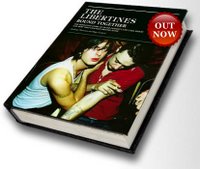If you're in Paris and suddenly need a quick fix of
The Odyssey or
Alice in Wonderland , or need a couscous recipe in the middle of the night, or are stuck for how to conjugate an irregular verb after hours, a dash to the nearest
book vending machine can put the right book in your hands in seconds and at the very reasonable price of $2.45 per copy.
The great thing about book vending machines is that they will appeal to people who do not normally buy books, and thus make reading much more accessible to the average Joe.
Surprisingly, book vending machines have actually been around for a very long time.
The first - in fact the first vending machine of any kind - was invented by English publisher and bookseller Richard Carlisle in the 1880's.
Book vending machines were introduced in Germany in 1912, and by 1917 there were 2,000 of them.
When Penguin Books first went on sale in 1935, they were apparently sold from towering wood and glass vending machines which were given the lovely name
Penguincubators. Apparently these are very much in demand among collectors and I was sad that I did not manage to turn up a picture of one.
The US apparently had
Read-O-Mat and
Vend-A-Book machines from the 1950's and original
Bantam Books were sold this way.
And now there seems to be a world-wide revival in selling books in this way.
There are book vending machines in the
Sao Paulo and Rio de Janeiro metro stations selling Brazilian classic literature, cookbooks and Paul Coelho's novels. The books are sold at the same low price (about $1.50) and are proving to be a success, selling 250 copies a month each.
And this one was snapped in
Santiago, Chile.

Germany is apparently rediscovering the book vending machine. A German publishing company decided to use this strategy a year ago to give their new unknown authors a chance to get noticed. Unfortunately the machines sell not only books, but food too so you get your book chilled along with your sandwich. How cool can you get!
Britain is also getting in on the act: book vending machines are being introduced onto platforms across the UK's rail network: a business venture by two well-connected entrepreneurs to
dispense short stories from vending machines on station platforms. each story will be between 7,000 and 12,000 words long, cost £1 and, because they are designed to be read in forty minutes or so, they will be printed on one sheet of paper and will fold up like a map.
Authors selected so far include PG Wodehouse, Dorothy Parker, Oscar Wilde, and Katherine Mansfield. The board of editors is no less illustrious and includes Beryl Bainbridge, Martin Amis, Dame Muriel Spark and William Trevor. The latter two have even written short stories especially for this imprint.
(Wow! If anyone comes across one of these machine, please buy the whole lot for me!)
Now don't you think that this is an idea that might catch on here in the Klang Valley? Can't you just see folks at LRT and Commuter stations popping a ringgit or two into a slot for a daily measure of entertainment?
Mind you, e-books are probably set to become the next big thing.
But apparently there's now vending machines even for those - and apparently the first country to jump on the bandwagon is
Australia!
Hmmmm ... aren't you glad you came to visit this repository of totally useless information today?
 Might soundtrack recordings to accompany our books be the next big thing?
Might soundtrack recordings to accompany our books be the next big thing?








 Germany is apparently rediscovering the book vending machine. A German publishing company decided to use this strategy a year ago to give their new unknown authors a chance to get noticed. Unfortunately the machines sell not only books, but food too so you get your book chilled along with your sandwich. How cool can you get!
Britain is also getting in on the act: book vending machines are being introduced onto platforms across the UK's rail network: a business venture by two well-connected entrepreneurs to
Germany is apparently rediscovering the book vending machine. A German publishing company decided to use this strategy a year ago to give their new unknown authors a chance to get noticed. Unfortunately the machines sell not only books, but food too so you get your book chilled along with your sandwich. How cool can you get!
Britain is also getting in on the act: book vending machines are being introduced onto platforms across the UK's rail network: a business venture by two well-connected entrepreneurs to